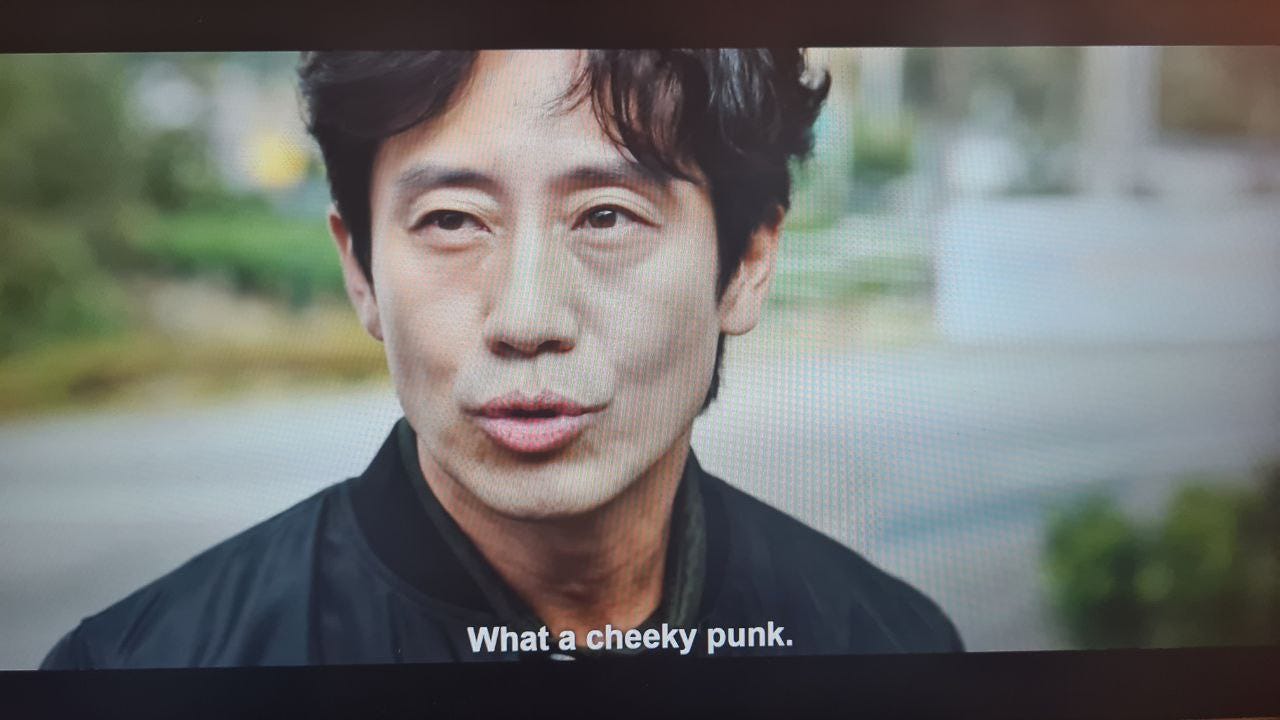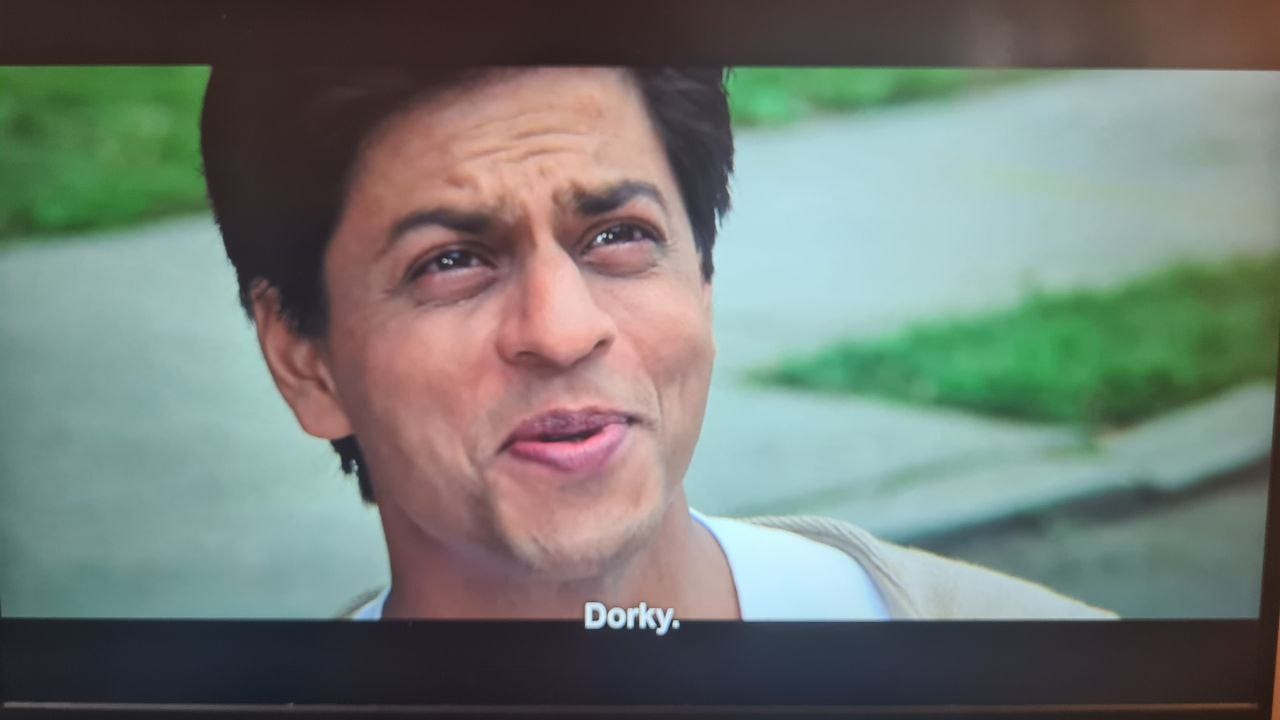Heyhey! How’s it going~~ Hope you’re having a good Saturday, wherever you are. Things on my end are more or less the same. This time of the year is busier than usual because of the exam season but I’m taking more deliberate steps to ensure I have breaks and get rest in between so things have been easier than previous years :)
Previously, I talked about how streaming giants like Netflix have impacted how we consume shows. Today, I finally unleash my rant about Netflix subs. It took me a while to figure out what I wanted to say and how I wanted to say it. But really, I think Netflix has to do better. Here’s why!
(Note: all screencaps today are pictures of Netflix shows I took myself. I don’t know how to screenshot Netflix shows so pictures are all I have.)
Take a look at this screencap from Beyond Evil, when Dong Shik (Shin Ha Kyun) mutters to himself that Joo Won (Yeo Jin Goo) is behaving like a ‘Duryeonnim’ (도련님) which either means ‘young master’. But Netflix translated Dong Shik’s quip as “What a cheeky punk.”
HOW does ‘cheeky punk’ encapsulate the ‘young master’ implication, how?? This is especially important also because, within the context of Beyond Evil, Joo Won is the son of the 2nd highest police officer in the entire country. Dong Shik’s remark was supposed to be a dig at how Joo Won behaves like he is better than everyone else because of who his father is. ‘Cheeky punk’ doesn’t even *begin* to capture that! He is not a cheeky punk! That is not what Dong Shik meant!
Also, for the first time on OTP Watch, I’m venturing outside kdrama because I was rewatching Kal Ho Naa Ho the other day (I know, I know. This one’s a tearjerker. I always stop after the first 30 mins or so.) because these subtitling discrepancies is not limited to Korean content. It’s pretty much a lot of non-Western content. In this 2003 Hindi film,Priety Zinta plays a bespectacled Naina and Shah Rukh Khan plays this dude, Aman, who moves in next door, Aman. When he sees her for the first time, he mutters “Chashmish” to himself, after pointing at her spectacles to imply that she might look better without them. While I don’t care at all for his ‘beauty tip’ (cos specs are the coolest, thank you very much), it irks me that Netflix translated his term of endearment to “Dorky.”
THAT IS NOT WHAT ‘CHASHMISH’ MEANS.
Ok, maybe if you consider the gist of what he meant, ‘dorky’ might cover it. But the word ‘chasmish’ comes from the word ‘chashma,’ which means ‘spectacles.’ So what he really meant was probably something like ‘Specky’ or ‘Speccy’, however that’s spelt. But yknow what I mean.
But okay. Maybe I ought to calm down, right? Maybe it’s not so bad. Some translators translate word-for-word while others focus on the gist. Maybe the Netflix guideline is to focus on the general gist? Right?
WRONG. WRONG. WRONG.
The gist is all well and good but then what about nuances! WHAT ABOUT NUANCES, I SAY!
Let’s take a look at our final exhibit for today. There are way more examples but in the interest of time, I had to choose and this is the one that aggravates me the most.
This is from the last episode of Reply 1994, where the gang gathers to watch the World Cup (it’s the South Korea v Italy match from the 2002 World Cup). Up to this point, Trash (Jung Woo) and Chilbong (Yoo Yoon Seok) haven’t been the best of pals. They’re not even pals, really, seeing as they were on opposite sides of a love triangle. Chilbong took a long time to accept and process that Na Jung’s heart had always been with Trash. In this scene, Trash is collecting bets for the game and Chilbong decides to switch his bet halfway but Trash is characteristically petty about it (he’s always trying to fill that big-brother-whos-gonna-make-your-life-difficult-for-fun role) and says Chilbong can’t switch his bet anymore. But Chilbong really wants to switch his bet at some point, he shouts an emphatic ‘Ah, hyung!’ which is translated here as ‘Hey!’
WHY WOULD YOU TRANSLATE ‘HYUNG’ AS ‘HEY’?
Subtitles are supposed to help us understand what’s going on in the scene, yes. Give us the gist, yes.
But Netflix subtitles seems to have erased cultural markers in language that would give us a better impression of the relational dynamics between characters. In Korean culture, women refer to older males as ‘oppa’ while men refer to older males as ‘hyung’. These terms are imbued with informality, familiarity and intimacy! And in this case, it’s hugely significant!
Earlier in the series, Chilbong had taken to referring to Trash as ‘sunbaenim’ which means ‘senior.’ Like ‘hyung,’ ‘sunbaenim’ establishes that one is older than the other, but it also adds an ambiguity because you don’t necessarily have to be close to your senior. Chilbong only started calling Trash ‘sunbaenim’ when he found out that Trash was the object of Na Jung’s affection. This suggests his intent to put distance between them, because he was trying to process his own feelings.
So, in the last episode, when he unwittingly yells ‘Hyung!’, Trash picks up on that. We pick up on that! A beat passes and that’s all there is. They don’t have a conversation about it because they don’t need to. Chilbong called Trash ‘Hyung’ after eons and that’s all that matters. 😭😭😭 This development between the guys IS part of the gist but it goes altogether unnoticed because, to Netflix, all we needed to know was that Chilbong was exclaiming. Are you kidding me! That exclamation was not just a white flag, it was a show of affection. It was an acknowledgment that they were properly friends now. Hell, they were more than friends. Chilbong saw Trash as a HYUNG. What’s more, viewers who picked up on Trash practically melting from happiness would have been confused too.
But yknow what’s the most aggravating thing about all this? It’s that this Western-centric just shows how colonialism continues to influence our understanding of culture today. I’ve only covered some examples but everything from allusions to puns to idioms are all interpreted through a Western lens. This whitewashing assumes that speakers of English continue to use Western frames of reference to understand other language, which is not the case! The use of Western terms basically sends the message that Korean or Indian or any other culture doesn’t actually matter as long as we find a Western alternative to convey what people mean. For a global streaming service, I honestly expect better and am demanding more.
Honestly, what exactly would we lose from translating ‘hyung’ into ‘hyung’ and ‘duryeonim’ into ‘young master’?? If anything, it’ll help us to gain a better understanding of the context. This is how community translators used to subtitle shows too. Before the streaming giants took over, most of us depended on community translators who would provide subs by Tuesday afternoon for a show that aired Monday night. And community translators would just explain puns or romanise words and would TRUST that viewers and audiences would be able to make sense of what they were watching. Instead of Netflix, which seems to think that spoonfeeding us Western interpretations of non-Western culture is the best way for us to understand everything.
But while I’m here for seamlessly watching shows from all around the world online, I’m 100% not here for the homogenization of culture. So Netflix, hire better translators. Because it’s not okay. Stop whitewashing subtitles and just give us good subs! Hire the community translators who do subs on Viki or other platforms! Figure it out!
Stop! Whitewashing! Our! Subtitles!
Coming up next on My OTP Watch (in no particular order):
Part 3.2 of my series on queer representation in kdrama (Check out Part 1, Part 2 and Part 3.1!)
Insights into the You Are My Spring OTP! Have you watched this yet?
Like what you’ve read? Share it with your friends! ESPECIALLY the ones who don’t like kdrama muahahahahaa
First time here? If you’ve enjoyed this and would like biweekly updates of My OTP Watch, please subscribe! :)








